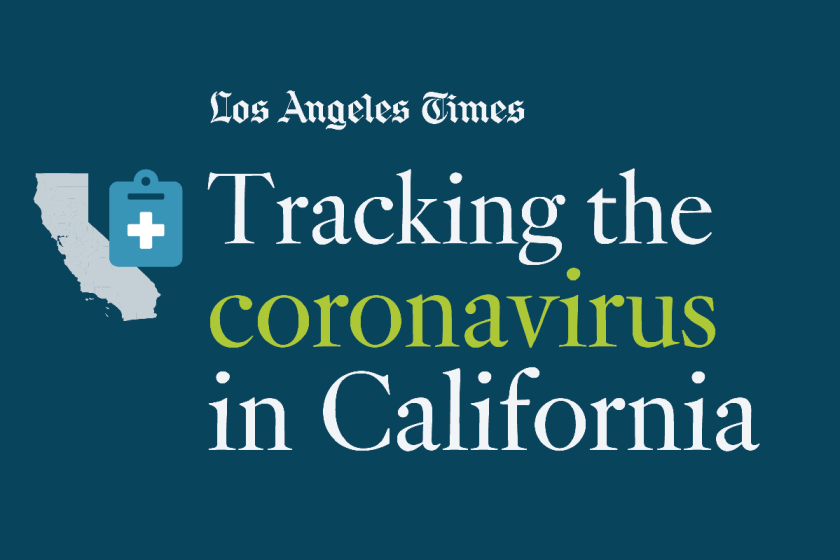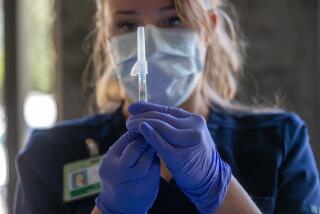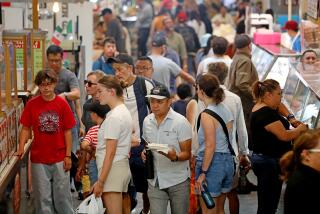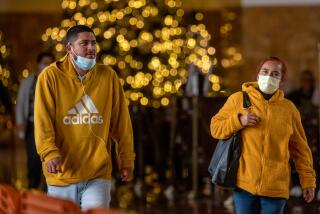Coronavirus now spreading faster in suburbs like Orange County than in L.A. County
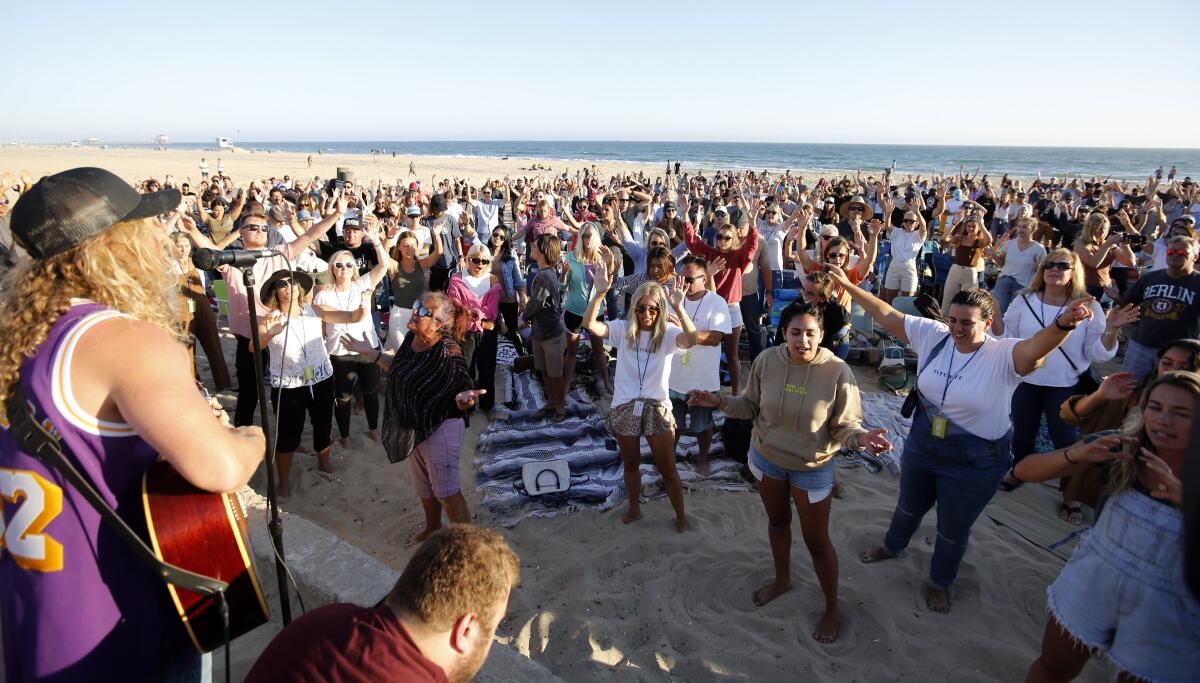
- Share via
In the first months of the pandemic, Orange County leaders looked at the frightening coronavirus outbreaks and rising death toll to the north in Los Angeles County and felt their communities were doing pretty well in comparison.
“Orange County has the lowest rate of confirmed cases in comparison to our neighboring counties,” Michelle Steel, chair of the Orange County Board of Supervisors, said on May 21, just two days before the county was cleared by the state to reopen restaurants for indoor dining. “Orange County is in good condition.”
For the record:
4:44 p.m. July 17, 2020An earlier version of this story said suburban counties surpassed L.A. County in growth of coronavirus cases over the last week. It was actually over the last two weeks.
But less than two months later, the conditions have changed dramatically. Over the last two weeks, Orange County as well as two other suburban counties to the east of L.A. — Riverside and San Bernardino — are reporting worse coronavirus case rates per capita than L.A. County, according to a Times analysis.
The shift is all the more dramatic because Los Angeles County — long the epicenter of the coronavirus in California — continues to see huge spikes in cases. On Thursday, it reported more than 4,000 new cases, shattering a one-day record. But the new surge in COVID-19 has been particularly painful for suburban counties that were eager to reopen their economies after months of stay-at-home orders and where political battles raged about whether the government should require residents to wear masks in public settings.
The three counties opened many businesses a week before Los Angeles County. And along with the decisions by all three counties to rescind local mask-wearing orders, some experts said that sent an unintended message to some residents that they could go back to old routines.
“What it does do is send you a psychological message to the community: ‘Hey, maybe things are getting better. Maybe I don’t have to worry anymore, or ... I don’t have to be as judicious with my activity and social distancing and masking and hygiene,’” said Dr. Shruti Gohil, associate medical director of epidemiology and infection prevention at UC Irvine and a professor of infectious diseases.
On July 1, Orange County had the lowest coronavirus case rate of the four counties, reporting 165 new cases over the preceding 14 days per 100,000 residents. San Bernardino County reported 222; Riverside County, 256; and L.A. County, 281. But by Wednesday, the trio of suburban counties now fared worse: San Bernardino County has 408 new cases over the preceding 14 days per 100,000 residents; Orange, 399; Riverside, 391; and Los Angeles, 372.
The community spread has brought other grim consequences. Orange and Riverside counties have seen the numbers of its hospitalized patients with confirmed coronavirus infection nearly triple in the last two months; in San Bernardino County, the number has more than quadrupled.
By contrast, counties that kept local mask-wearing orders without interruption reported a smaller increase in hospitalizations. In L.A. County, hospitalizations have increased by 29%; in San Diego County, by 23%.
Health experts are particularly concerned about the backlash about wearing masks, which has been especially pronounced in Orange County, where educators proposed a plan to reopen schools without masks or social distancing.
In Huntington Beach on Thursday, as the sun burned down on the shoreline, almost no one on the beach was wearing a mask. Neither were the people walking on the streets outside the restaurants, which were open only for outside dining. The beach was full of towels and people, and the ocean was dotted with surfers and swimmers.
Robert Hurtado, 58, sprawled out on the steps by the city’s pier. He had nothing better to do, he said, because everything was closed and he couldn’t find work during the pandemic — a pandemic he doesn’t really believe in.
“It’s a hoax. A lot of these cases are people eating bad seafood and drinking contaminated water,” said the maskless Hurtado, an Orange resident. He did, however, say he believed the virus was bad in “Third World countries. We’re not able to do nothing… I can’t even go the the gymnasium, can’t go to the movie theaters, can’t go to the restaurants — they’re playing games.”
Up the road, Lisa Campbell, a 27-year-old Huntington Beach resident, walked out of a restaurant, to-go bag in hand. “I think it’s all bull—,” Campbell said.
In her opinion, the numbers look bad because “everyone is getting tested for coronavirus” and “they’re giving a lot of false positives.” She wasn’t wearing a face covering. “Wearing a mask is kind of outrageous to me. Think about all of the other illnesses,” Campbell said.
She worried that her daughter, who will be heading to kindergarten in the fall, will have to wear a face covering to class. “I’d hate to send my child to school with a mask on her face, and when she’s 18 she’s afraid of society ’cause she has to wear a mask all the time,” Campbell said.
The latest maps and charts on the spread of COVID-19 in California.
In fact, the coronavirus pandemic is the world’s worst public health crisis in more than a century, and the mainstream medical establishment is virtually unanimous in now saying that masks are essential to controlling the spread of disease and reopening the economy. The fact that hospitalizations are surging is proof that coronavirus disease transmission is worsening, experts say.
“The data is clearly there: that masking works,” Dr. Robert Redfield, the director of the U.S. Centers for Disease Control and Prevention, said in a webcast with the Journal of the American Medical Assn. on Tuesday. “If we could get everybody to wear a mask right now, I really do think that in the next four, six, eight weeks, we could bring this epidemic under control.”
But mask resistance remains strong. Orange County’s former health officer, who issued a mandatory mask order, resigned after receiving a death threat; it was her replacement who rescinded the order. The rescission was reversed a week later by Gov. Gavin Newsom, who on June 18 issued a statewide mandatory mask order.
In recent weeks, some Orange County elected officials, including Steel, have urged residents to wear masks in public settings, and some people are heeding the advice.
In the face of alarming increases in coronavirus cases and hospitalizations statewide, Newsom two weeks ago ordered bars and indoor restaurant dining in most of the state to be shut. This week, he ordered the rest of the state to also close bars and indoor dining rooms. And in the hardest-hit counties that are home to more than 88% of the state’s population, he also ordered the shutdown of businesses such as gyms, malls, nail salons and hair salons.
“With Orange, it’s all about defiance ... defiance about personal protection,” said Dr. Peter Chin-Hong, a professor of medicine and an infectious disease specialist at UC San Francisco. “When you look at places that enforce masks, in general, by state, they tend to do better.” A recent study found that mandating face mask use in public is associated with a decline in the daily COVID-19 growth rate, and such mandates may have averted up to 450,000 deaths.
The Orange County executive officer, Frank Kim, said Thursday that he did not think Orange County’s case rate was out of line with its neighbors. “Obviously, there are some days where one county is higher than another, but I did not see us as an outlier within the large urban counties in Southern California,” Kim said.
A spokeswoman for Riverside County, Brooke Federico, said Thursday that officials believe the increase in cases dates to Memorial Day, with the main drivers being increased social gatherings and residents moving about in the community, attending protests and visiting businesses. “Now is not the time to go to parties or visit with people outside of their household,” Federico said.
Federico wrote that the rescission of the mask order in early May in Riverside County “was to be in alignment with the state.” At that time, counties were given the authority to decide on their own whether to institute a mandatory mask order. “The county has always maintained that wearing face coverings is important to slowing the spread of the disease,” Federico said.
Corwin Porter, interim public health director for San Bernardino County, said he believes the county is seeing more cases because of “an increase in private gatherings brought on by recent holidays and the onset of summer, the reopening of businesses, protests during June, and less vigilance by individuals and businesses in physical distancing and wearing of face coverings.”
“We have intensified our efforts to urge safe practices and we believe that will make a difference in the long run,” Porter wrote in an email. He said the message he will continue putting out there is for people to not gather; to practice physical distancing; and to “wear face coverings, which is mandated, to reduce the viral spread.”
More to Read
Sign up for Essential California
The most important California stories and recommendations in your inbox every morning.
You may occasionally receive promotional content from the Los Angeles Times.
